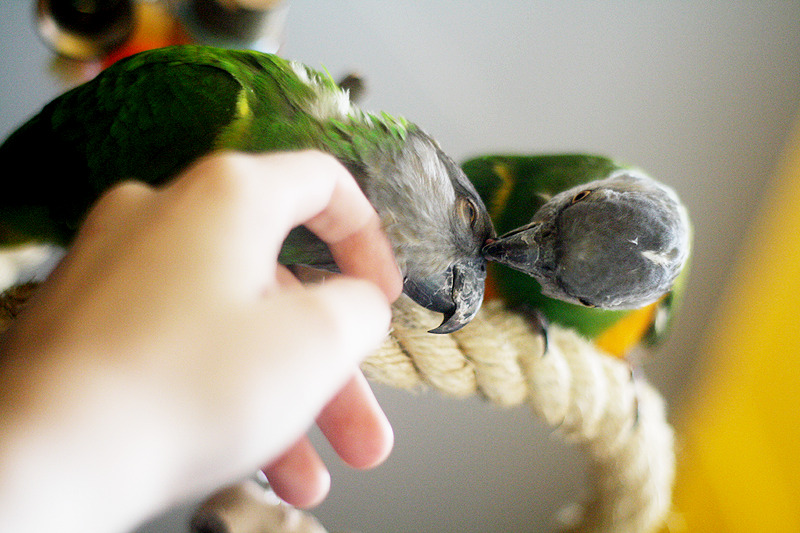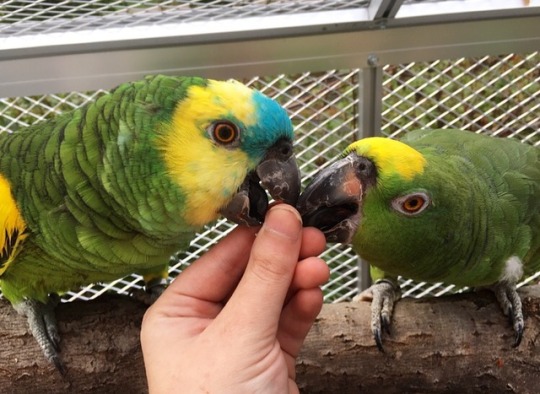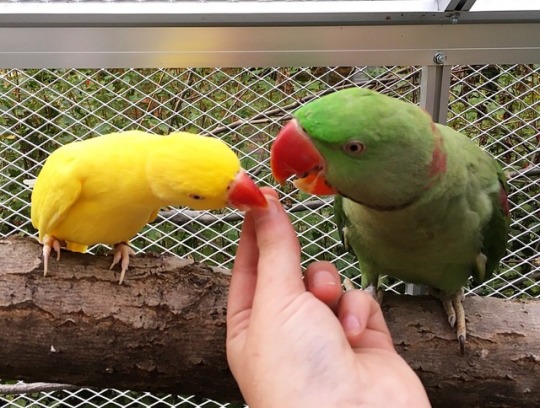I'll have to slightly disagree with previous posters tbh. Yes, you shouldn't get another bird EXPECTING the two to get along and you should always be ready for any potential outcome, especially being prepared to have two completely separate birds who can't be out of the cage together - which of course means having time over to properly hang out with both of them separately.
I DO, however, believe that getting a bird friend for a bird ISN'T inherently wrong. I'd go as far as to say that it's inherently GREAT, actually. Again, you need to be prepared for every possible outcome, and you need to understand how your species works ethologically and how you should handle the introduction process etc. But parrots are VERY social flock living animals and it's highly unnatural for them to ever be left alone.
Two very, very common problems in pet parrots are "my bird screams constantly when I'm away or out of the room", and "my bird doesn't move or play with their toys when I'm at work". Why do you think that is?
Looking at a parrot's natural living conditions, they're prey animals and they're flock-living, the flock works together to look for food and water and to spot predators and warn the rest of the flock about them - the individual parrot would never leave their flock because that would mean being MUCH more exposed to predators and other dangers.
So what does a parrot who's accidentally been left behind or gotten away from their flock do? They find a safe perch and they don't move until their flock comes back for them. They scream (contact/flock call) to let their flock know where they are.
...And in captivity,
we're usually their only flock. So what do they do when we leave for work? They find a safe perch and they don't move until their flock comes back for them. They scream to let their flock know where they are.
These aren't problem behaviors. They're very natural, instinctual, and useful behaviors.
After a while they
might learn that however much they scream, their human won't come back until the late afternoon. They
might get more comfortable with moving around in their cage and playing with their toys.
But for me personally, that's not good enough.
I've studied ethology (the scientific study of animal behavior focused on behavior under natural conditions and in the biological context of anatomy, neurobiology, phylogenetics etc) and animal care & zookeeping with applied ethology, ie, "why does this animal in captivity display this particular behavior - where would it be useful in nature and how can we help make their environment as enriching as possible with that in mind?" - in my studies, the need in social, flock-animals for being able to interact with other animals of the same species or genus even in captivity, has always been a very important factor in the health and well-being of those animals. We wouldn't keep a social animal alone in a reputable zoo, so why would I do it in my home?
While
this study doesn't have solo housed parrots as its main focal point, they do bring up the differences in behavior and over-all health between solo housed parrots and group housed parrots, and I thought it was a very interesting read.
Here in Sweden, keeping parrots alone if you're leaving for work etc for a couple of hours each day, isn't even legally allowed. Our government acknowledges their need for social interaction at all times so if you can't properly replicate the social exchange a bird would get from a bird friend, they they need a bird friend of their own species or genus (even if they can't share a cage they should be able to see and hear eachother at all times).
Usually it works out more than great to introduce two birds together in Sweden and still have them be bonded to their human, so I'm a bit puzzled as to why it seems to be so much harder in the US for example.

I do, however, suspect that it's got something to do with the fact that as of 2014, it's also illegal to hand-rear baby birds unless they're abandoned by their bird parents. This places a need on breeders to breed social companion birds with eachother so that the baby birds can learn from their parents, when they're ready, that humans are good peeps that they can hang out with and don't need to fear. (believe me, most of my current birds are parent-raised and they are in NO WAY less social or tame with me than a hand-raised bird. The biggest difference is they're more well adapted and have less behavioral issues.) And even before this law was put in action, the baby birds had to stay with their parents for at least a couple of weeks before beginning the hand-raising, so that they could learn how to be birds for at least a while. This, I believe, helps a lot with birds realizing that they are birds, other birds are birds, and humans are NOT birds, but they're still fun to hang out with!
Anyway, this is slightly off topic though, I just wanted to speculate as to why most parrot households in Sweden seems to be able to successfully keep multiple parrots who are still good companion birds. Heh.
So it should make sense to you that since birds are "flock" animals, they always want to have a close bond/relationship with a "flock-mate". And if their human owner is the only available "flock-mate" and as long as they like them and their owner treats them well, loves them back, and is not at all abusive to them, then the bird is going to bond closely with their owner, and they are now their "flock-mate". HOWEVER, once another bird is brought into the home, if they like the new bird and the new bird likes them, then it's just natural that they then choose the new bird as their "flock-mate" and no longer want their mate to be their human owner, as they are always going to prefer "one of their own"
I can not for the life of me wrap my head around how this statement would be FOR keeping single birds. Why would I want a bird who's incredibly bonded to me as a partner, when I have to leave my house for several hours each day? Why would I want to put them through that devastating and highly unnatural separation each day, when every single fiber of their being knows that they're meant to never, ever leave the side of their bonded partner? Why would I want to put my own selfish human wants over the needs of the bird I'm supposed to love? Why would them preferring to love someone else over me, someone who's actually able to spend every minute of the day by their side, be a bad thing?
From my experience in introducing my own companion birds to other birds of their own species or genus (two senegals, two ringnecks, a ringneck and an alexandrine, two amazons, and, not really introducing to eachother, but keeping two cockatiel brothers together. mostly adult rehomes), it's WONDERFUL when they take to their new bird friend. They always change for the better, their behavior, their happiness, their health, their willingness to fly and be active and to forage and play with their toys... Everything changes for the better, EVERY time. What DOESN'T happen is them forgetting about me. They like me, they like my company, they like my cuddles, and they love training. As long as I make myself interesting to be around, they will ALWAYS choose to hang out with me. ...But if I don't put any effort into it? Of course they won't need me. I need to still be a beneficial part of their life, of course. It might take some extra effort. But it's absolutely never impossible and it's TO ME always worth it!
Most parrot species DON'T only have ONE flock member in the wild. They have great big flocks. It does not make sense to me that they should not be able to have larger flocks in captivity too.
I personally very very much prefer it when they know they're birds and they choose to hang out with me, a human, because they WANT to. Not because it's their only option because they don't have the opportunity to be a real bird with a real bird partner or flock. I want them to choose to interact with me. I don't want them not to HAVE a choice.
With all of that said though, I totally get that not everyone is in a position to keep multiple birds. I'm absolutely not opposed to other people only being able to keep one bird! It does take a LOT of work and effort and time and not least a whole bunch of space to be able to keep multiple birds and I know that I'm very lucky to have all of that. I also know that I'm likely very lucky to be somewhere where the norm actually IS to keep birds who like birds AND humans the same - I suspect that might be a factor in my "success" too.
So I'm absolutely not judging or looking down on anyone with single birds!
But I DO want to do my part in spreading the word that there really is nothing better in the world than watching two birds love eachother and affect eachother's health and happiness drastically for the better just by being around one another. <3
...But one should absolutely be responsible about it, do PLENTY of research, have ALL of the back-up plans ready, and be very prepared for anything not to work out the way they wanted to.





